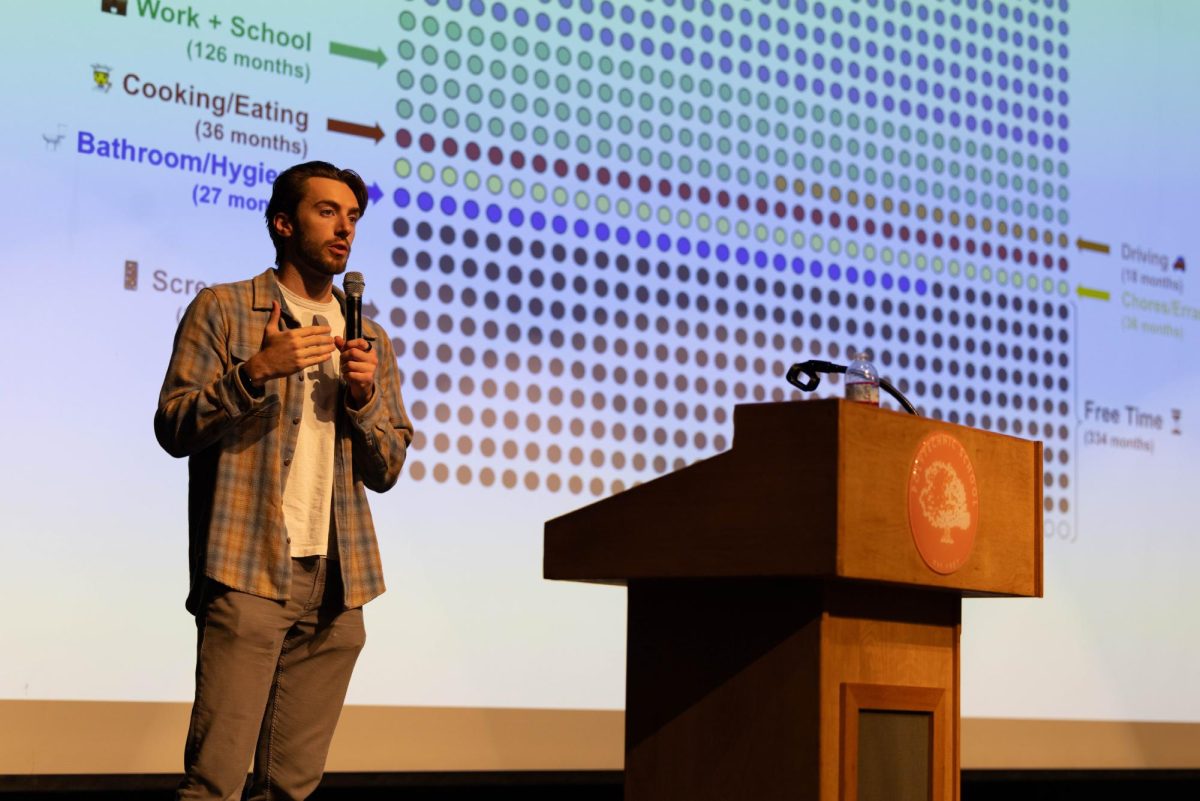
“Get a real alarm clock. Waking up and falling asleep on your phone is such an easy habit to fall into, but to me, that’s one of the number one things to change. If you can protect the last 30 minutes and first 30 minutes of the day from doomscrolling, it makes it a lot easier for the other 24 hours.”
This was one of many suggestions that Dino Ambrosi, founder of Project Reboot, offered during his second presentation on screen addiction to Poly’s Upper School in Garland Theater on Thursday, Oct. 9. The presentation revisited the major points of his first presentation to Poly on Oct. 1, 2024, and Ambrosi also announced that Project Reboot would begin a long-term partnership with Polytechnic School as one of its “Beacon Schools.”
In this year’s presentation, Ambrosi highlighted the importance of empowering students over relying on phone and technology bans to foster healthier uses of technology. For students focused on reducing screen time, Ambrosi introduced “The Project Reboot Challenge,” which guides students in setting intentions and enhancing focus. The challenge originated from Clearspace, an iPhone application that allows users to limit access to addictive apps based on screentime and number of uses. This year, the application was made free for all students up to 21 years old.
Around 61% of the Poly students polled during the assembly said they felt addicted to their phones, and nearly three-quarters reported spending more than two hours daily on non-productive screen time.
“Poly should be more strict,” freshman Jimmy Fu said. “During class, [students] should have to leave their phones in their backpacks, not their pockets, because that is very distracting.”
During the assembly, Ambrosi prompted students to try to recall the content of the videos they’d consumed while mindlessly scrolling through social media apps. Reflecting on this, sophomore Clive Chao said, “I’m going to be more conscious about how much time I’m spending because I honestly don’t remember anything I watched yesterday on Instagram.”
Some students, however, voiced concerns about what a partnership between Poly and Project Reboot might entail; senior Lennon Standridge commented, “If Poly were to instate a phone ban, which after the assembly some of us thought they might be considering, I don’t think it would be as beneficial since so many people rely on their phones for not only personal things but academic [ones].”
Project Reboot has plans to host future assemblies and involve students in a Project Reboot club. Ambrosi shared, “My hope is that Polytechnic School can be one of the first schools to prove that there’s a better way to approach the problem, and that’s by bringing students into the conversation and focusing on creating this cultural shift among the student body that’s led by the students, where we don’t say it’s all bad, and we shouldn’t use it, but we have more honest, transparent conversations about the ways in which it is affecting us, and we work together to try to mitigate those issues.”
The Project Reboot club would be divided into two teams: advocacy and engagement. Both teams aim to foster a positive campus culture and improve personal relationships. The advocacy team would oversee broader outreach, like creating social media content, sending out newsletters, and running community initiatives. The engagement team would focus on shifting the culture around device use on campus. This team might lead challenges on Clearspace or set up time for reflection during Advisory blocks.
“This battle against addictive technology is not something you can snap your fingers and win overnight. It’s a continued journey, and it has ups and downs,” Ambrosi said. “Treat every day like a new one. Don’t let yesterday’s screen time dictate what today looks like. The story you tell yourself about your screen time matters a lot.”
Upper School English teacher Laura Marion said, “I’ve been concerned about overuse of technology for years, mine, my children’s, my students, so I was excited to hear what Dino Ambrosi could offer in the way of solutions. Since his presentation, I have been enjoying the Clearspace app, which I downloaded immediately after the assembly.”
“For those interstitial moments, I’m going for Dino’s ‘3 minutes of boredom.’ For news consumption, I plan to spend my week reading the physical Sunday NY Times, doling out a few articles a day,” she added.
Elsie Dang, another Upper School English teacher, shared, “His suggestions were necessary reminders that we all could improve in meaningfully and mindfully connecting with each other and disconnecting ourselves from our phones. After the assembly, I also now ask myself, ‘Am I opening social media to escape something?’ This thought process made me more aware of my own habits so I can gradually break them.”